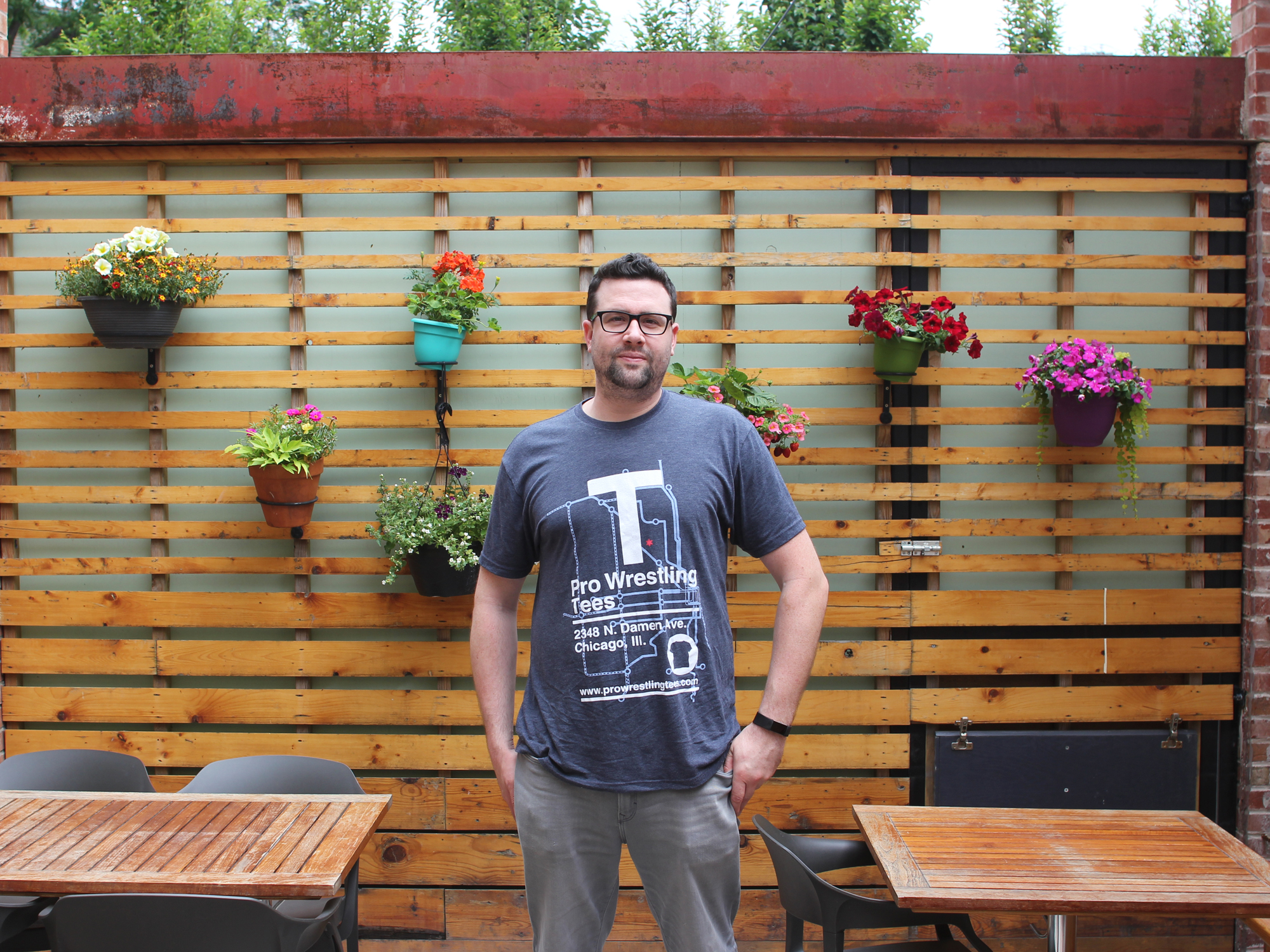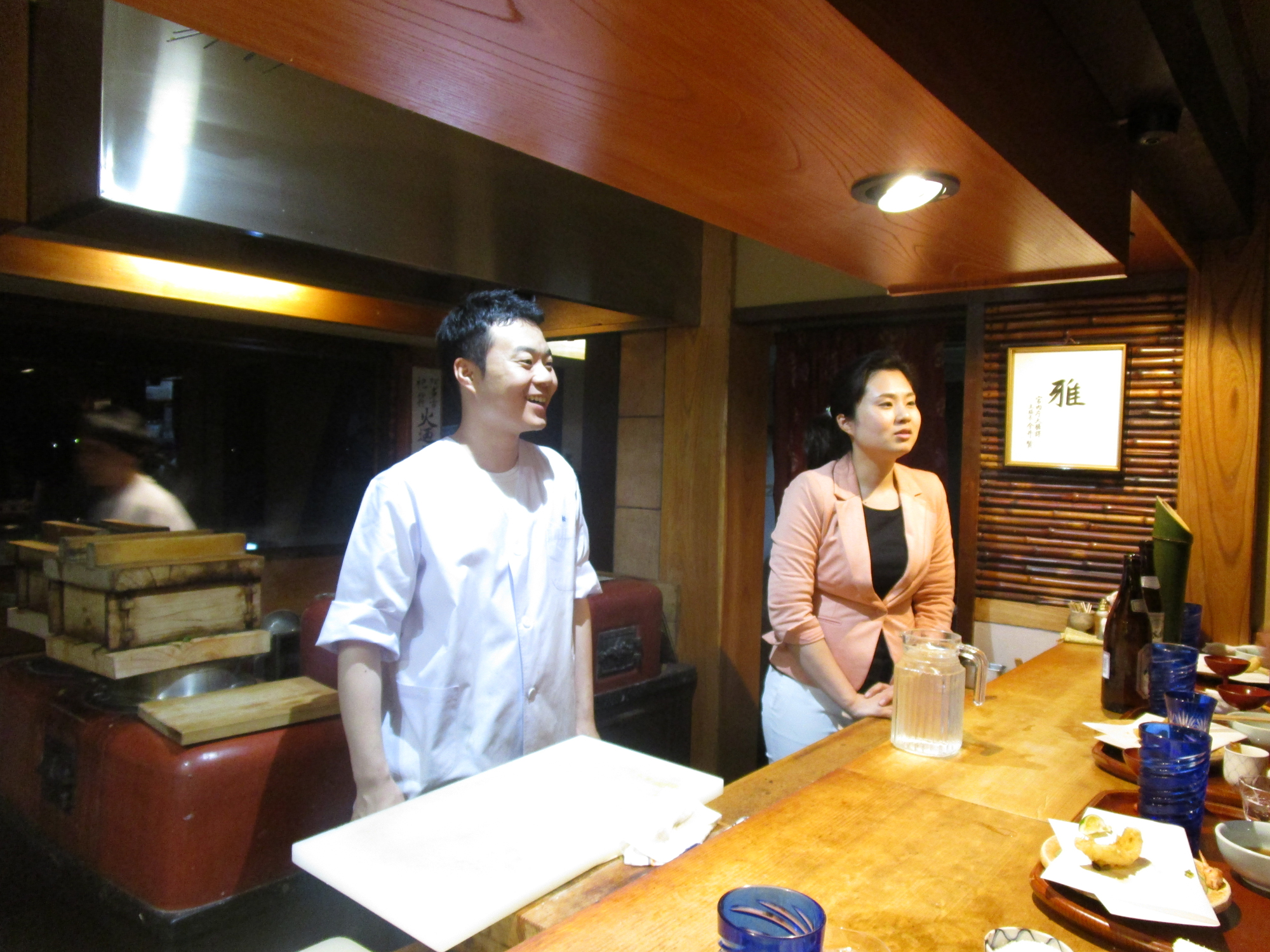AMID BLOCK-LONG BUILDINGS AND BUZZING RESTAURANTS in River North, there’s a tiny haven where perfection is quietly pursued. Its story starts in a small kitchen garden in Charlotte, North Carolina in the 1980s. Nestled within a suburban neighborhood, a young Japanese mother made little wonders grow—herbs and shiso leaves, daikon radishes and Japanese eggplant, Asian cucumbers and Napa cabbage and the Japanese sweet potato satsumaimo. Ingredients that were foreign to their neighbors allowed her family to maintain their Japanese culture in the United States.
“My father was a traditionalist,” Gene Kato says. “He wanted to maintain the Japanese culture within our household. So, my mom would always cook Japanese food within the house. It was difficult to cook traditional Japanese food in America, especially in Charlotte, because of product.”
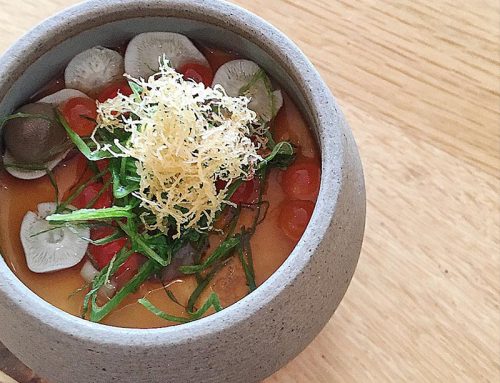 Food Fiction Project
Food Fiction Project Chilled tofu
Chef Kato absorbed his family’s adherence to simplicity and tradition, reflecting these same principles in his cooking today.
“My mother’s ability to cook is what started my appreciation of food,” Kato says. She had Gene and his brother when she was young herself, and together, the boys and their mother would cook gyoza, Japanese vegetables, and miso soup. “My mother once sat me down and said, ‘Gene, I won’t cook for you forever. You have to learn to cook for yourself.’”
FAST FORWARD TO THE EARLY 2000s, and Gene Kato is the founding chef and partner of Japonais, a glitzy, hugely popular Asian spot which is creating a market in Chicago for trendy, spot-the-celebrity Japanese food and will spawn followup locations in Las Vegas and New York.
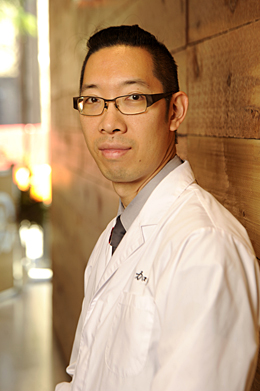
Chef Gene Kato
“Our run with Japonais was unbelievable and crazy. Restaurants are very much luck of the draw; you need to be in the right place at the right time with the right concept. Japonais was the perfect storm,” Kato recalls.
Kato credits Japonais as the place where he “really grew up.” He says, “I’ve always been the type to do it myself. But at Japonais, that mentality stopped working. I couldn’t carry that load, so I had to adapt and learn to trust other competent people to express my passion.”
As he delegated more of the cooking responsibilities, Chef Kato’s schedule started to become weighed down with managerial duties. “I was spending two weeks in Chicago, one week in Las Vegas, one week in New York and then doing it all over again for five years. It was crazy. The last year for sure took a toll on me.”
As much as Chef Kato wanted to be more involved with the Japonais kitchens, he knew that his presence on the line would take away opportunities for the staff he was trying to train. “The higher up I got, the less I was cooking. I knew I wanted to rebalance my career—to create an opportunity for myself where I could manage, cook, and oversee everything.”
With that realization, Chef Kato walked away from thriving Japonais in 2011 (the franchise was taken over by Morimoto, and closed in 2015) to build his dream—Sumi Robata Bar.
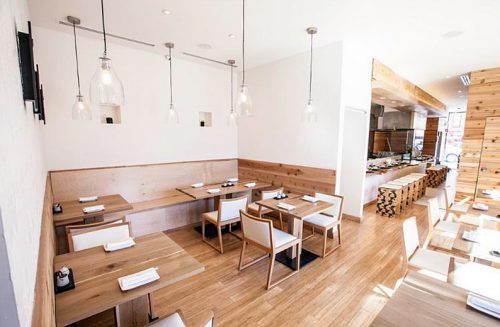 Sumi Robata Bar
Sumi Robata Bar ALMOST HIDDEN ON AN UNASSUMING CORNER of Wells and Huron in the River North district of Chicago, Sumi Robata Bar maintains Chef Kato’s outlook of minimalist perfection. The 70-seat space is not what one expects a Japanese restaurant to look like these days. There’s no Asian or anime kitsch; the interior opts for clean lines, marble floors, and tan wood with accents of charcoal, water, and lots of natural light. The menu imparts the same sense of restraint.
“A lot of young chefs are always about creating new dishes. But there’s something to be said about the core of a restaurant. That is what should be perfected day in and day out. There’s no reason for someone to come back so often only for specials. You need people to come back every day for the core of the menu.”
Diners won’t find anything trendy-for-trend’s-sake at Sumi Robata Bar. The concept is all about proteins being grilled to perfection, served with authentic and light Japanese sides. The most unique part of it all? Almost everything you eat is cooked by Chef Gene Kato himself.
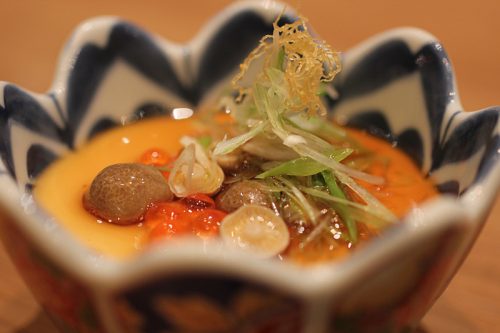 Michael Gebert
Michael Gebert Tofu bowl
“You’ll go to name-driven restaurants where you eat the recipes of those chefs, but not their actual food. At Sumi, you’re eating something I make with my own hands. And that brings me a lot of pleasure, to personally hand my customers their food or cook almost every dish for them. It gets crazy at times, but….” Chef Kato leans back in his chair, shrugs and smiles. “A lot of people who rise on top just want to do it for the show and the glory. I just want to constantly improve my craft.”
This could explain why the name Gene Kato rarely makes the food media among Chicago’s top chefs, though Sumi is well respected within the industry—he was nominated for Chef of the Year at last year’s Jean Banchet Awards, and was a semifinalist for Best Chef: Great Lakes at the James Beard Foundation awards.
“Name recognition is not important to me. It makes me happy when people come in for the first time and have no clue about Japanese food or robata and then are blown away,” he says. “Or when Japanese customers come from out of town and have a traditional experience. That’s a huge compliment. Hands down, customers are my recognition. Nothing else matters.”
“What I strive for every day is to perfect the same thing every day.”
With everything at Sumi Robata Bar, Chef Kato takes pride in the traditional inspiration and the painstaking personal effort. “I designed the whole space and picked out every single piece of material. The Charcoal Bar isn’t black from paint. It’s black because we took each wooden panel to the burbs and burned it ourselves.”
As for the food? “The core menu is set. The only thing I change is the takigori, which is seasonal. What I strive for every day is to perfect the same thing every day. The way that I did the grilled Madai the first two years is different than the way I do it now.” Chef Kato experiments on a daily basis with temperature, timing, technique of cutting, and so on to continuously find better ways to make the same dish more exciting.
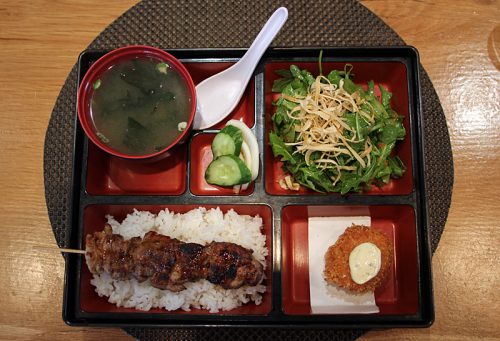 Michael Gebert
Michael Gebert Bento box lunch in perfect harmony
“It’s hard for me to find kitchen staff sometimes because this can seem boring. But the difference is in how you look at it. I look for people that have the same appreciation for my philosophy.”
Sumi Robata Bar has a staff of ten and they all share in the work equally. During the week, diners will only see one server and one runner for the entire restaurant. “When someone is really busy, the focus becomes heightened,” he says.
Chef Kato does have thoughts of opening up another restaurant, even smaller than Sumi Robata Bar (“maybe just a yakitori bar”) in the future. But, for now, he’s content with pushing the boundaries of and balancing traditional-based concepts in a foreign country. “I think it’s very important for everyone that’s learning to cook at an early stage to relate to how the craft came to be. If you don’t understand how things came to be or the reasons why it evolved, you don’t really know what you can and cannot do,” says Chef Gene Kato.
Sabrina Medora is the founder and author of Food Fiction Project on Instagram as well as the writer for Behind Chicago Food for ChicagoNow. In her spare time, Sabrina enjoys hot yoga, reading, exploring big cities, collecting Harry Potter books, and binge-watching competitive cooking shows like Top Chef and Chopped.
COVER PHOTO: Michael Gebert
Latest
Join the Discussion
After you comment, click Post. If you're not already logged in you will be asked to log in or register with Disqus.






